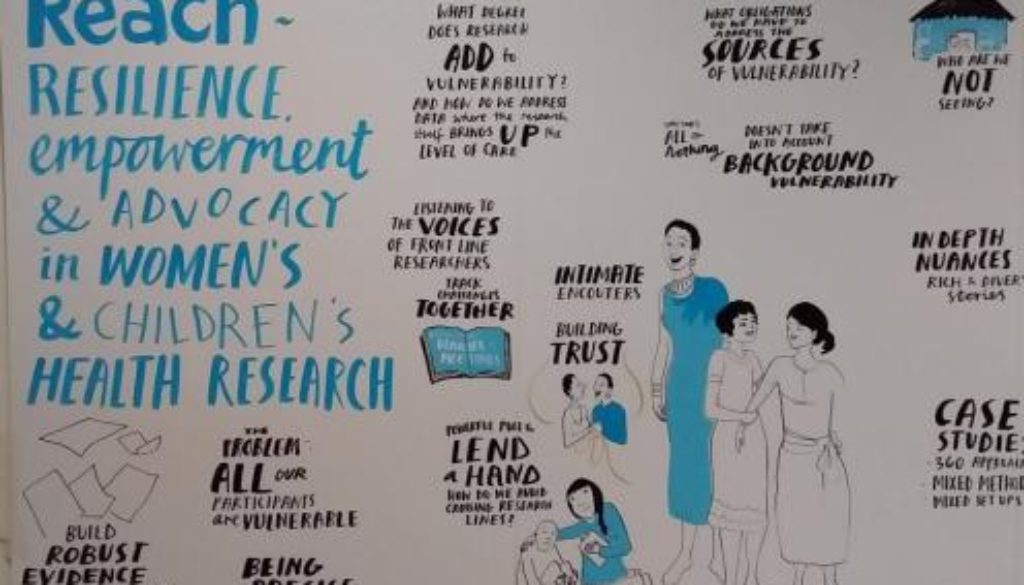The vulnerability and health research paradox: Ethics, gender, trust and power
We were delighted to be part of a rich set of discussions on vulnerability, agency and resilience in a meeting organised by REACH in Oxford in May.
Sassy Molyneux and Sally Theobald
Maureen Kelley kicked off the day highlighting an important paradox in health research: on the one hand research can be powerful tool for social justice in ensuring that interventions are evidence based; but on the other, there is need to protect ‘the vulnerable’ and ensure research does not worsen vulnerabilities. Current ethics guidelines do not adequately unpack or address this paradox leading to potential for all children, all women or the very poor/marginalized to be labelled as “vulnerable” and excluded from research. Yet it is these groups for whom evidence-based health interventions are most needed, raising important challenges for social justice in health. Unpacking complex intersections between dignity, vulnerability, agency and abilities in different health research contexts, and researchers’ responsibilities in designing and conducting global health research, is a key aim of the REACH collaboration. Here we share some of our key learning from the meeting:
1. CONTEXT MATTERS in how the vulnerability paradox is experienced, and contexts are fluid and changing. This can affect the vulnerabilities experienced by research participants and communities, and researchers’ responsibilities. For example, the Kenya team showed how health worker strikes in Kenya (one lasting seven months!) brought new dilemmas for researchers in face of diminished health care, with poor and marginalized groups particularly adversely affected. In other REACH study sites, where borders are contested and fluid, many research participants are migrants with specific economic and political vulnerabilities. For example, Thai colleagues highlighted that in the border regions of Mae Sot (next to post-conflict Myanmar) people are constantly shifting across borders in efforts to seek care and livelihoods. In so doing they encounter new legal and political threats. Research studies on malaria and other endemic diseases in the region offer promise of better interventions for these populations but teams face challenging dilemmas in deciding how best to respond to complex social, political and health needs.
2. COMPLEX POWER RELATIONSHIPS OPERATE AT ALL LEVELS, and are shaped by context. To support ethics practice in research and identify interventions that support social justice, complex power relations need to be unpacked and understood. For example, within households, intersecting inequities related to gender, age and education interplay to shape vulnerabilities, and are in many contexts shaped by patriarchal norms and values. These intersecting influences affect interaction with and uptake of health services, social support and research. In South Africa for example, Busisiwe Nkosi cautioned that the current emphasis by funders on girl centered interventions (for example of adolescent girls and HIV) can leave adolescent boys feeling excluded, with negative implications for everybody. As researchers learning about such influences and effects, we have to think about our responsibilities to respond: if, when, how and through whom? Complex power-relations also operate at many other interfaces in ways that have important implications for ethics practice, including between researchers of different seniority in institutions, between institutions, and between researchers and funders.
3. TRUST, VALUES AND RELATIONSHIPS are critical in negotiating how gendered power relationships play out in different contexts. Navigating these relationships is a challenging and often under-recognised job. It is often left to ‘fieldworkers’ or front line research staff from local communities to juggle the role of insider roles (as community members) and outsider roles (linked to the institutions that employ them). This critical interface role in conducting health research needs to be recognized, and staff consulted and supported in identifying and handling the multiple ethical dilemmas that can emerge.
As researchers we ourselves are part of these complex power relationships. As Bobbie Farsides noted in the discussion around the inclusion of children in research, in planning and conducting our research we should ensure that vulnerability does not function as a stop sign, but rather as an alert. This alert should be to ensure we understand the issues at stake, minimize any potential to exacerbate vulnerabilities, and work ourselves – or through appropriately placed collaborators – towards a more just society through action or advocacy. Intersectionality analysis, with its focus on power and how this plays out in multiple ways, as well as the structural factors that underpin power (political, economic, institutional) can offer a helpful way forward.

